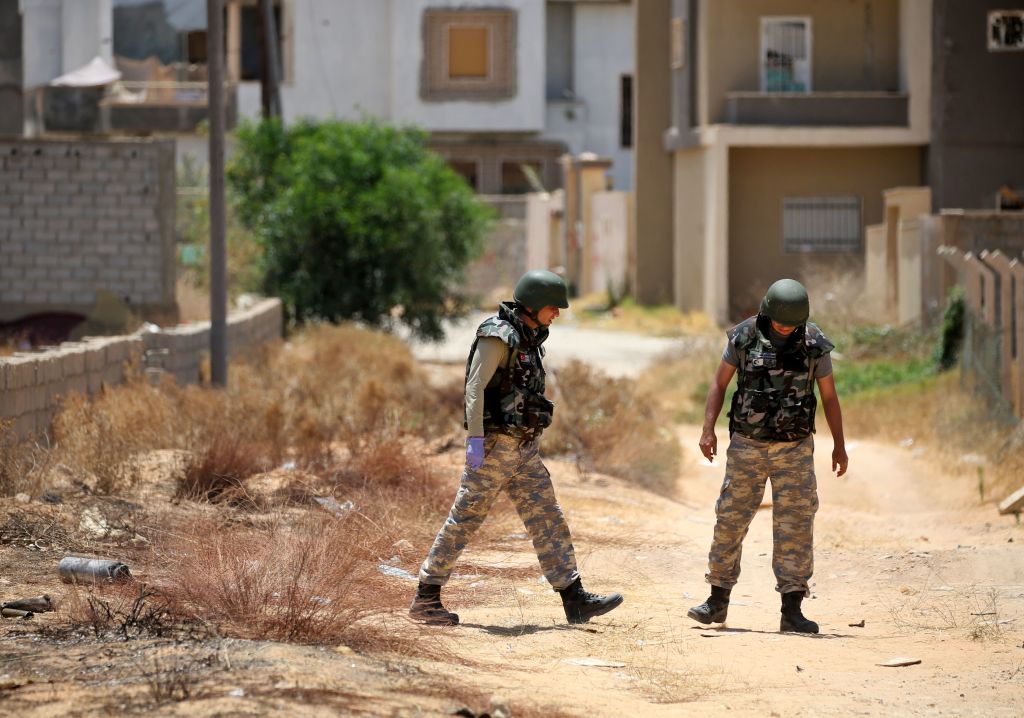ADF STAFF
Long after a battle to control Tripoli erupted in 2019, Libya’s rival factions have continued to rely on foreign fighters. Analysts say that although these fighters aren’t highly visible, their continued presence delays the country’s reconciliation and unification.
Field Marshal Khalifa Haftar, the Libyan National Army leader based in Benghazi, relies on Russian paramilitary forces for support and protection. Haftar is committed to seizing Tripoli,
where the country’s internationally recognized Government of National Accord (GNA) is based.
Turkey supports and protects the GNA, and has also has deployed Syrian fighters around the national capital.
“Both sides have paid their foreign backers for their assistance, allowing them to build a
permanent presence in Libya at little cost,” wrote researcher Wolfram Lacher of the Science and
Politics Foundation (SWP) at the German Institute for International and Security Affairs.
This benefits Russia and Turkey, who want to secure a strategic foothold in Libya.
Foreign Forces Less Visible
According to Lacher, Libyan civilians historically have been averse to the presence of foreign troops. It did not calm anxieties when Russian forces terrorized Sirte shortly after the cease-fire, shelling a residential area and occupying civilians’ homes.
In a southern suburb of Misrata, Syrian fighters also occupied the houses of displaced people,
fueling tensions with neighbors.
Lacher, who has visited Libya several times since the cease-fire, now reports that although Russian, Syrian and Turkish forces remain in Libya, their presence gradually has grown less visible.
In Sirte, Russian forces in 2021 moved from areas they occupied to an air base in Qardhabiya. In
Sirte and Jufra, Russian mercenaries once routinely showed up in shops and restaurants,
sometimes carrying weapons. But such excursions have become far less frequent. Residents say it is even less common to see the fighters outside their bases in Brak and Tamanhant.
“On the rare occasions that they do appear in public, they now invariably wear civilian clothing, signaling that they are on their day off,” Lacher wrote in an SWP report.
The formal Turkish military presence is confined to a few military bases between Misrata and
the Tunisian border. It is now “extremely rare” to see Turkish military personnel off their bases, Lacher wrote.
All this suggests to Lacher that the foreign forces are being ordered to limit their interactions
with locals in efforts to gain acceptance.
‘Conspicuous, Power-Hungry’
Of the three countries, Russia is “the most conspicuous, power-hungry player poised at Libya’s
doorstep,” according to the Atlantic Council’s Karim Mezran. The Kremlin also is keen to
spread a new form of “Russian colonialism,” the Royal United Services Institute reported this
year.
Libya is a hub for Russian paramilitary deployments in Sub-Saharan Africa and possibly for
maritime power projection in the Mediterranean. “To serve those goals, keeping a low profile appears to be the right approach,” Lacher wrote.
The Kremlin has gained a modicum of acceptance, according to Lacher, but fear of repression by
Haftar’s forces effectively limit open opposition to Russia’s presence. The same is true for
residents around Tripoli who once spoke against the presence of Syrian and Turkish forces.
According to Gregory Aftandilian, a nonresident fellow at the Arab Center Washington DC,
the continued presence of foreign forces — and the involvement of other countries in Libyan
affairs — makes it more difficult to hold long overdue national elections.
“The involvement of these foreign countries makes it hard for those Libyans who want a
genuine Libyan solution to prevail,” Aftandilian wrote. “If a unity government were to
emerge, such foreign forces undoubtedly would come under greater scrutiny and face political
pressure to leave. Hence, the presence of these foreign forces helps to perpetuate the country’s
political divisions.”
The obstinance of Libya’s rival governments also exacerbates the country’s political impasse,
hinders plans to hold elections and risks further instability, Abdoulaye Bathily, head of the
United Nations Support Mission in Libya (UNSMIL), told the U.N. Security
Council.
Despite enhanced engagement efforts to help Libyan stakeholders resolve contested issues
regarding electoral laws and the formation of a unified government, Bathily said in a U.N. report that he has been met with “stubborn resistance, unreasonable expectations and indifference to the interests of the Libyan people.”

